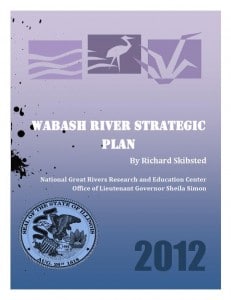 Flowing for over 500 miles from its west-central Ohio headwaters to its confluence with the Ohio River in southern Illinois, the Wabash River is the largest un-dammed river east of the Rocky Mountains. For those living along the Wabash, planning to protect and enhance the river’s future has become a necessary priority.
Flowing for over 500 miles from its west-central Ohio headwaters to its confluence with the Ohio River in southern Illinois, the Wabash River is the largest un-dammed river east of the Rocky Mountains. For those living along the Wabash, planning to protect and enhance the river’s future has become a necessary priority.
Earlier this summer, the Office of Illinois Lt. Governor Sheila Simon conducted a survey of residents in the Wabash River watershed as an initial step in gathering public input that will help direct future watershed planning efforts. Almost 250 people responded from all 18 counties that lie within the watershed’s boundaries.
Results from the survey indicate that clean, healthy rivers are a high priority for Wabash River watershed residents:
- 97.6 percent gave the highest rating of “very important” to drinking water as a use of water
- 57.3 percent think restoring wetlands is effective method for preventing flooding
- 48.4 percent consider watershed restoration and conservation projects to be of “high” importance (the top ranking)
- 48 percent place a “high” level of importance (the top ranking) on preserving natural resources along the Wabash River Watershed
- 42.7 percent think the state of Illinois should make easement programs like the Conservation Reserve Enhancement Program or Wetland Reserve Enhancement Program more available in the area.
An initial draft of the Wabash River Strategic Plan Draft 1 will be discussed at today’s meeting of the Wabash and Ohio Rivers Coordinating Council, from 1:30-3:30 pm, in the Student Center Building Auditorium, Lake Land Community College, Mattoon, Illinois.
“Public input is an important component of this process. The Wabash and Ohio Rivers Coordinating Council is a public body that strives to improve the economic and ecologic vitality of the basin through cooperative projects and initiatives. The stakeholder process will be ineffective without broad public support and feedback,” says Olivia Dorothy, the Lt. Governor’s Senior Policy Advisor for the Environment. “We invite everyone to review the document and send comments the Office of Lt. Governor, so that the Council can improve its strategic plan.”
Public comments on the Strategic Plan will be accepted through December 6, 2011.







